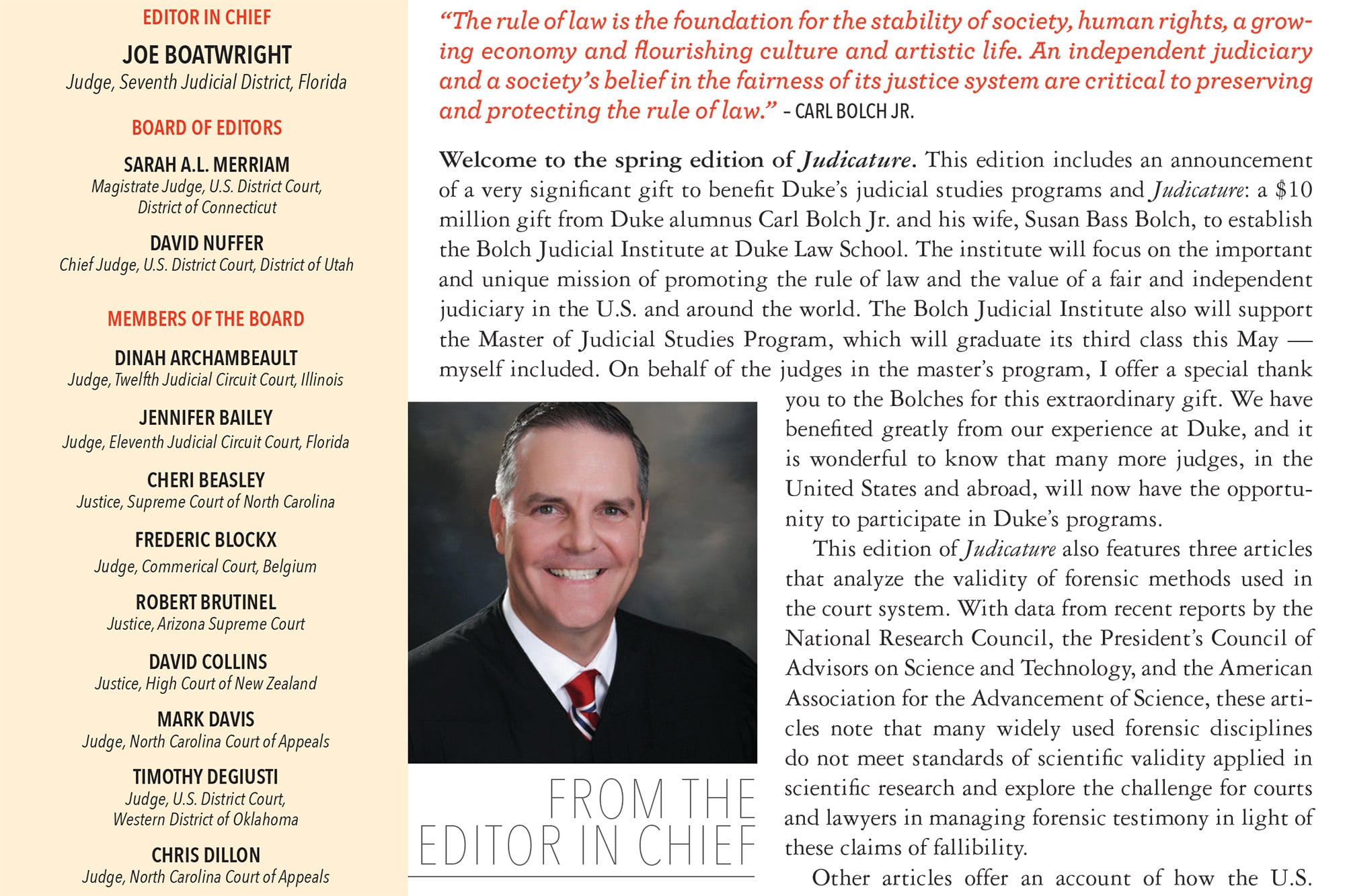From the Editor: Thank you
Vol. 102 No. 1 (2018) | Forensic Fail | Download PDF Version of Article
Welcome to the spring edition of Judicature. This edition includes an announcement of a very significant gift to benefit Duke’s judicial studies programs and Judicature: a $10 million gift from Duke alumnus Carl Bolch Jr. and his wife, Susan Bass Bolch, to establish the Bolch Judicial Institute at Duke Law School. The institute will focus on the important and unique mission of promoting the rule of law and the value of a fair and independent judiciary in the U.S. and around the world. The Bolch Judicial Institute also will support the Master of Judicial Studies Program, which will graduate its third class this May — myself included. On behalf of the judges in the master’s program, I offer a special thank you to the Bolches for this extraordinary gift. We have benefited greatly from our experience at Duke, and it is wonderful to know that many more judges, in the United States and abroad, will now have the opportunity to participate in Duke’s programs.
This edition of Judicature also features three articles that analyze the validity of forensic methods used in the court system. With data from recent reports by the National Research Council, the President’s Council of Advisors on Science and Technology, and the American Association for the Advancement of Science, these articles note that many widely used forensic disciplines do not meet standards of scientific validity applied in scientific research and explore the challenge for courts and lawyers in managing forensic testimony in light of these claims of fallibility.
Other articles offer an account of how the U.S. Court of Appeals for the Tenth Circuit is addressing the ever-important issue of judicial health and a perspective on canons of construction and judicial writing from Bryan Garner, who offers a lively response to an article published in the winter edition of Judicature by Joseph Kimble. In keeping with the tradition of Judicature, this edition includes another installment of the Storied Third Branch, “Icon of the Bench and Gridiron,” honoring the life of Florida Seventh Judicial Circuit Judge Kim Hammond and written by Judge Hammond’s good friend and chief judge of the Seventh Judicial Circuit, Raul Zambrano. Our Point-Counterpoint for this edition highlights Masterpiece Cakeshop Ltd. v. Colorado Civil Rights Commission, a case pending before the U.S. Supreme Court; two religious liberty scholars, professors Frank Ravitch and Brett Scharffs, provide differing perspectives on the case’s implications. Finally, one of Florida’s finest appellate court judges (and my colleague in the LLM program), Spencer Levine of the Florida Fourth District Court of Appeal, provides a book review of Lead Yourself First, Inspiring Leadership Through Solitude, by Judge Raymond Kethledge of the U.S. Court of Appeals for the Sixth Circuit and co-author Michael Erwin.
It has been my pleasure to serve as the editor in chief of this edition of Judicature. Once again, on behalf of the May 2018 graduating class of the Judicial Studies Program, special thanks to Mr. and Mrs. Bolch for their wonderful gift to support judicial studies at Duke and to continue to give judges the incredible opportunity that I and my fellow members of the Class of 2018 have enjoyed.

Joe Boatwright, Judge, Putnam County, Seventh Judicial Circuit, Florida.

